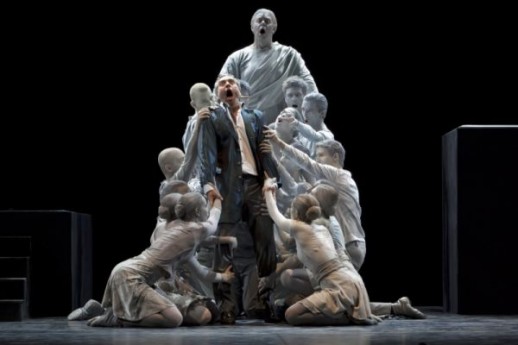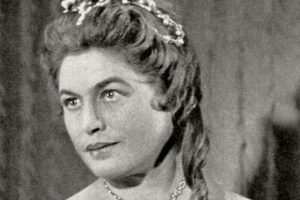

Christopher Alden’s version was New York City Opera’s biggest (and only?) hit last season while the Met is gearing up for a new production this fall by famed theater director Michael Grandage. However, Thursday evening’s audience at the Rose Theater knew that it was in for something very special after only a few arresting bars of the overture from conductor-director Iván Fischer and his deluxe Budapest Festival Orchestra.
Opera has never played a big part at the festival; however, I have attended some memorable events there. For the bicentenary of Mozart’s death, Lincoln Center performed each and every work by the composer and most of his early operas fell into the summer festival, including a fine Lucio Silla with a thrilling young Cecilia Bartoli as Cecilio and a wildly uneven Mitridate starring a relatively unknown Christine Brewer and a sadly out-of-place Tatiana Troyanos.
The festival provided a rare opportunity to hear the Richard Strauss rewrite of Idomeneo, which in its original version proved Les Arts Florissants’s undoing several seasons later. Peter Sellars brought his bewildering production of Zaide in 2006; however, my allergy to Heidi Grant Murphy meant I unfortunately had to forego Mark Lamos’s staging of Il Re Pastore.
Nothing I’d seen at Mostly Mozart though compared to the Hungarians’s thrilling take on Mozart’s great masterpiece which used the original Prague version (meaning no “Dalla sua pace,” “Mi tradì,” or, of course, the shaving duet). As stage director, Fischer explained in his program note that his Don Giovanni is a 21st century sex addict, one who, unlike the Count in Le Nozze di Figaro, cannot be pardoned, a Don obsessed with flesh.
Hence Fischer’s very corporeal realization used sixteen young performers from the Budapest Acting Academy as the chorus, the sets and even the furniture. Clad in white with their faces and hair covered by white make-up, they played streetlights, a carriage for Zerlina’s entrance, Elvira’s window, even the Don’s dining table in the final scene. Occasionally they also become characters in the drama: the Don’s conquests from Leporello’s catalog come alive, or Donna Elvira’s serving girl, or the members of Zerlina and Masetto’s wedding party. While their ingenious acrobatics were sometimes distracting, on the whole it proved an ingenious conceit, as the stage was otherwise bare except for two black boxes.
Fischer also explained that the singers are playing themselves (wearing their own clothes)—whatever that means! In any case, he drew exceptionally natural performances from the cast—one saw them as real people inter-relating not as archetypes going through their predetermined motions. Other than in the Sellars production where they were played by identical twins, I have rarely seen a Giovanni and Leporello so similar—both vaguely middle-aged, of about the same height and build making the identity-switching in the second act uncommonly convincing. And for once the pair seemed much more like friends than master and servant—with an easy and comfortable camaraderie as they played out their usual games in one final go-round.
Portuguese bass José Fardilha, a name previously unknown to me, does Leporello a lot but there was no trace of routine is his warmly sung and appealing portrayal. The evening’s biggest problem, and frankly a problem with many productions, was the character of Giovanni himself. Despite Fischer’s announced intention to portray a contemporary sex addict, Tassis Christoyannis came across with little sense of erotic compulsion—this was most apparent in his ravishing “Là ci darem la mano” which was softly seductive but scarcely libidinous since he and Zerlina were on opposite sides of the stage, he on top of the taller black box, she at stage level.
Fischer’s one jarring nod to contemporaneity was having Giovanni (while pretending to be Leporello) take a toke of weed before passing it around to the chorus during “Metà di voi qua vadano.” While Giovanni can be directed to be demonic or desperate or dangerously sexy, Christoyannis was none of these—just a good-humored, aging roué trying to go about his usual business and having a really bad day. Therefore, the powerful ending of righteous retribution lost its power as this Giovanni was little threat to the status quo.
Sunhae Im (veteran of many René Jacobs recordings) was a strictly old-school soubrette Zerlina but a charming one nonetheless. She had the advantage of the superbly charismatic Masetto of Riccardo Novaro who nearly stole the show away from its less sparkling Don. His gradual melting to Zerlina’s pleading “Batti, batti” was a gem of subtle comic-acting.
I was less taken with Myrtò Papatanasiu’s Elvira. Strikingly beautiful in her flaming red dress and long black hair, this Greek soprano (who came to prominence replacing Angela Gheorghiu in Franco Zeffirelli’s production of La Traviata in Rome in 2007) has a somewhat edgy voice with a prominent vibrato, and although she also sings Donna Anna quite a lot as well, Mozart wouldn’t seem to be the best choice for her and I, for one, didn’t miss “Mi tradì.”
Directed by Fischer to be the most epicene Don Ottavio ever, Zoltán Megyesi was the weakest singer, sounding as if he’d wandered in from a gig as the Evangelist in a bus and truck tour of Bach’s “St. Matthew Passion.” At the last minute, to his credit, he pulled off a surprisingly credible “Il mio tesoro.”
After a variety of disappointing performances in Mozart and Richard Strauss at the Met (I recall a particularly unfortunate Queen of the Night in the late 90s), I wasn’t expecting much from Laura Aikin as Donna Anna, but instead she was the revelation of the evening. A fearless and gleaming Anna, Aikin proved nearly ideal, particularly riveting in her convulsive narration of the night of her father’s murder abetted by Fischer’s incisive accompaniment. While one wonders if she would be as commanding in a large theater (the Rose seats just over 1,100), Aikin earned the loudest bravos of the singers, second only to Fischer and his magnificent orchestra.
Packed into the Rose’s small pit, the splendid Budapest Festival Orchestra bristled with excitement under Fischer’s high energy conducting, his tempi brisk but not breathless. The woodwind playing was particularly ravishing. Fischer used natural trumpets and horns and the harpsichord played with the orchestra throughout rather than in just the recitatives; and while the singers used a very occasional appoggiatura, Fischer didn’t go further with other period performance practices. It was a performance firmly grounded in the Classical era rather than the sometimes common trend to perform Don Giovanni as if it had been composed by Beethoven (or some other 19th century Romantic).
Unfortunately, only two performances were scheduled when clearly such an intelligent and musically high-quality production could have sold three or four times as many shows. After Saturday’s repeat, Fischer remains in New York to conduct the festival’s own orchestra and the lovely English soprano Lucy Crowe in an all-Mozart program next week.
Photo: Lincoln Center for the Performing Arts, Richard Termine.
























Comments